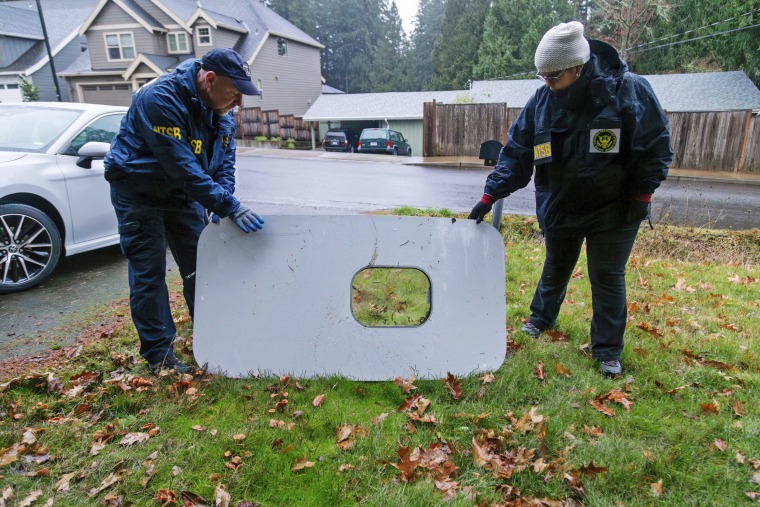Maker of Boeing door plugs was sued over ‘quality failures’ before midair Alaska Airlines blowout

The manufacturer of the Alaska Airlines door plug that detached midair during a flight was the subject of a class action lawsuit last year that alleged “widespread quality failures.”
Boeing is under intense scrutiny after the mishap Friday on Alaska Flight 1282. A panel of the plane snapped off just six minutes after takeoff, leaving a gaping hole and utterly terrifying passengers. The packed 737 Max 9 plane, bound for Ontario, California, returned to its takeoff point in Portland, Oregon.
Spirit AeroSystems, the manufacturer of the door plug, said Wednesday it’s supporting the National Transportation Safety Board investigation into the flight. “As a company, we remain focused on the quality of each aircraft structure that leaves our facilities,” the company, which isn’t connected to Spirit Airlines, said in the statement.
Court documents reveal that Spirit AeroSystems’ investors have long had issues with the quality of its products, especially after the 737 Max tragedies in October 2018 and March 2019 in which two planes went down, killing all on board.
The company was the subject of a federal class action lawsuit, filed in New York in May by its investors, alleging a history of “constant” quality failures.
Spirit AeroSystems is the main supplier of parts to Boeing, and one of its primary roles is manufacturing the majority of the fuselages used in Boeing 737 aircraft, the suit said.
Spirit AeroSystems didn’t immediately respond to a request for comment on the lawsuit. A spokesperson for Boeing responded that the company has nothing to add regarding it.
While the suit didn’t specifically mention door plugs, that part of the plane is attached to fuselages.
The suit said that despite investor emphasis on the importance of the 737 Max program after the downed plane tragedies, Spirit AeroSystems made promises and shared statements about its refined processes and safeguards but allegedly “concealed from investors that Spirit suffered from widespread and sustained quality failures.”
The failures included defects such as “the routine presence of foreign object debris” in its products, missing fasteners and peeling paint.
The suit alleged that quality failures were the result a company culture that prioritized production numbers and short-term financial outcomes over quality.
Spirit AeroSystems’ quality failures were so severe and persistent that Boeing placed it on probation for multiple years, from 2018 through 2021, the filing said.
The suit highlighted an ethics complaint made known to investors in March 2022, which alleged that an employee was told to falsify documents to underreport the number of defects in Spirit AeroSystems products.
The employee’s email said, “I have lost faith on the quality organization here at Spirit and this is my last cry for help into resolving this issue.”
Quality failures mentioned in the suit included mis-drilled holes on the 737 Max aft pressure bulkhead, “a very significant problem” that a Spirit AeroSystems product and process verification core quality auditor brought to light in October 2022, the suit said. That bulkhead is necessary to maintain cabin pressure during flight. The suit claimed that despite the defect’s being reported, Spirit AeroSystems concealed it.
In August, Boeing revealed to the media that it identified “fastener holes that did not conform to our specifications in the aft pressure bulkhead on certain 737 airplanes,” the complaint said. Then Spirit AeroSystems “belatedly” confirmed the issue in a news release, the suit said.
Another alleged quality failure was defective tail fin fittings on certain 737 Max aircraft.
Boeing revealed to the media that it learned of the defect on April 13. It was revealed the defect was due to Spirit AeroSystems’ improper installation of the fittings, the suit contended. Spirit AeroSystems “belatedly confirmed the tail fin fittings defect” after Boeing revealed it.
When those issues came to light, the suit said, they led Spirit AeroSystems’ stock to decline, and the plaintiffs suffered “significant losses and damages” due to the company’s “false and/or misleading statements and/or material omissions.”
In the Alaska Airlines case, investigators will look into whether the blown-out door plug was a result of the Spirit AeroSystems manufacturing process or the Boeing assembly line.
www.nbcnews.com


